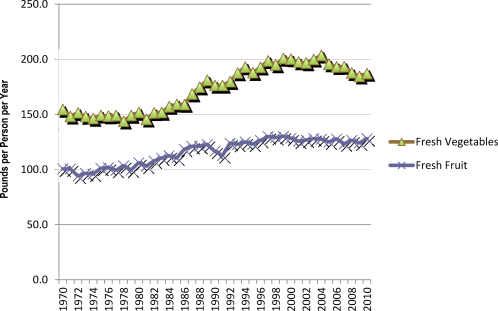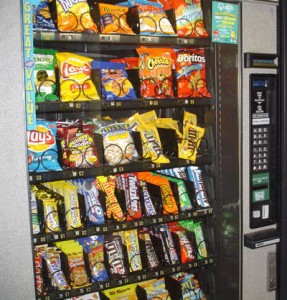That physicians, nutritionists, and scientists have been telling the American public for years about the danger of high fructose corn syrup, and the recent documentary Fed UP, a recent analysis by economists concludes the major reason for obesity are the inexpensive and available snacks and beverages.
Consider that food prices are historically low, and food is readily available. The food is made ready-to-eat. If you don’t wish to make it the restaurants offer it at prices that are quite low. This is- as one study recently pointed out, one of the major factors contributing to obesity.
Fruit and vegetables are also more available now, than at any time in our recent history. As seen from the chart of the article:

“Examining time trends for which there are data, what jumps out are changes in food availability, in particular the increase in caloric sweeteners and carbohydrates. Average daily discretionary calories from salty snacks, cookies, candy, and soft drinks now exceed the discretionary calories recommended in the Dietary Guidelines for energy balance and essential nutrients and the ratio of consumed to recommended discretionary calories is a significant predictor of BMI in the population”
What is lost in the major messages of dietary cults is the subtle underlying message common to all that this article pointed out:
Stop eating free sugars in beverages – including juice and watch out for the sugar filled coffee drinks
Stop eating snacks that are packaged
Soda is not on anyone’s healthy list and have a skeptical eye toward juices

Will eating more fruits and vegetables make you thin? Not if you keep snacking on the free sugar.
Will exercise make you thin – depends on how much time you will devote to it.
The unaffordability of healthy food may not be the problem as far as obesity is concerned; it is the excess availability and affordability of all types of food. Effective policy interventions must address the need to reduce calories in the diet and replace calorie-dense foods with fruits and vegetables, rather than just add fruits and vegetables to the diet.
This is the message that no snake food company, from Coke to Cheetos wants you to hear:
“Many policy interventions are focusing on “positive” approaches or messages, such as increasing fruit and vegetable consumption and increasing physical activity. However, an emphasis on reducing discretionary calorie consumption, particularly SSBs and salted snacks, may be a promising lever to reduce overweight and obesity. The majority of adults exceed the amount of recommended discretionary calories for energy balance. Although increasing fruit and vegetable consumption may be a laudable goal for other health reasons, it is unlikely to be an effective tool for obesity prevention.”
While The American Beverage Association wants you to hear: just exercise more and that High Fructose Corn Syrup is safe – here is some tweets from them:
-
We can’t regulate people to health & singling our one source of cals causes confusion. All calories count & activity is key.
-
Untrue. As FDA approval makes clear, HFCS is safe. In fact, our bodies process it the same as table sugar.
Here was their post to me: -
@drterrysimpson High Fructose Corn Syrup is safe. FDA approves & science shows it’s virtually identical in structure to table sugar.
Yes- the body does process HFCS the same as table sugar- with devastating consequences – see here.
REFERENCE
Chart and quotes from
Obesity and Economic Environments, R Sturm, R An; CA Cancer J Clin 2014; published early online May 22, 2014 doi: 10.3322/caac.21237.

 LetsClearItUp @LetsClearItUp
LetsClearItUp @LetsClearItUp